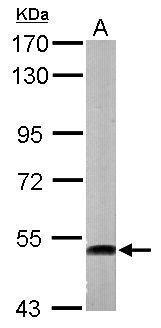ATP6V1H Rabbit Polyclonal Antibody
CAT#: TA307969
Rabbit Polyclonal antibody to ATP6V1H (ATPase, H+ transporting, lysosomal 50/57kDa, V1 subunit H)
Other products for "ATP6V1H"
Specifications
| Product Data | |
| Applications | WB |
| Recommended Dilution | WB:1:500-1:3000 |
| Reactivities | Human, Mouse |
| Host | Rabbit |
| Isotype | IgG |
| Clonality | Polyclonal |
| Immunogen | Recombinant fragment corresponding to a region within amino acids 169 and 444 of ATP6V1H (Uniprot ID#Q9UI12) |
| Formulation | 0.1M Tris, 0.1M Glycine, 10% Glycerol (pH7). 0.01% Thimerosal was added as a preservative. |
| Purification | Purified by antigen-affinity chromatography. |
| Conjugation | Unconjugated |
| Storage | Store at -20°C as received. |
| Stability | Stable for 12 months from date of receipt. |
| Predicted Protein Size | 56 kDa |
| Gene Name | ATPase H+ transporting V1 subunit H |
| Database Link | |
| Background | This gene encodes a component of vacuolar ATPase (V-ATPase), a multisubunit enzyme that mediates acidification of eukaryotic intracellular organelles. V-ATPase dependent organelle acidification is necessary for such intracellular processes as protein sorting, zymogen activation, receptor-mediated endocytosis, and synaptic vesicle proton gradient generation. V-ATPase is composed of a cytosolic V1 domain and a transmembrane V0 domain. The V1 domain consists of three A and three B subunits, two G subunits plus the C, D, E, F, and H subunits. The V1 domain contains the ATP catalytic site. The V0 domain consists of five different subunits: a, c, c', c", and d. Additional isoforms of many of the V1 and V0 subunit proteins are encoded by multiple genes or alternatively spliced transcript variants. This gene encodes the regulatory H subunit of the V1 domain which is required for catalysis of ATP but not the assembly of V-ATPase. Three alternatively spliced transcript variants encode two isoforms of the H subunit. [provided by RefSeq] |
| Synonyms | CGI-11; MSTP042; NBP1; SFD; SFDalpha; SFDbeta; VMA13 |
| Note | Seq homology of immunogen across species: Chicken (96%), Pig (99%), Xenopus laevis (94%), Zebrafish (91%), Bovine (98%), Xenopus tropicalis (94%) |
| Reference Data | |
| Protein Pathways | Epithelial cell signaling in Helicobacter pylori infection, Lysosome, Metabolic pathways, Oxidative phosphorylation, Vibrio cholerae infection |
Documents
| Product Manuals |
| FAQs |
{0} Product Review(s)
0 Product Review(s)
Submit review
Be the first one to submit a review
Product Citations
*Delivery time may vary from web posted schedule. Occasional delays may occur due to unforeseen
complexities in the preparation of your product. International customers may expect an additional 1-2 weeks
in shipping.






























































































































































































































































 Germany
Germany
 Japan
Japan
 United Kingdom
United Kingdom
 China
China




